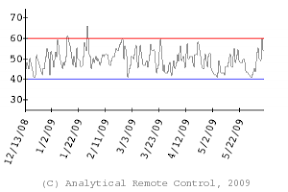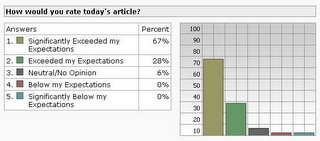*Updated 1/8/06 with new resource link (see end of story)
One of our long time friends sent us a link last week
which really got all the fellow parents here very,
very nervous about identity abuse of children.
The link leads to a video story by MSNBC detailing how
sexual predators use the internet to actually come to their
intended victim's home.
What particularly struck us about the video, was just
how easily the predators were able to get personally
identifying information on kids. Using this information,
the predators (according to experts as many as
50,000 are on-line regularly out of an registered total
of over half a million nationally) are able to quite literally
find directions right to the intended victim's home and/or school.
Here's how:
They can gather personal information about the child
through an on line profile, a chat room discussion, or the
child's screen name. Using this information, they may
be able to locate the child's home telephone number
and then determine where the child resides.
With the use of on-line reverse address directories,
the child predator can find the intended victim by
inputting a name, city, or even a phone number
and in some rare instances even an email address.
So the victim identification process engaged by the
predator may have been much longer and riskier in the
past, is now unfortunately all too convenient with the
same tools used by identity thieves and available on
the internet.
Similar in a way to the identity theft scams known as
"phishing" & "pharming", many under age minors
unwittingly accelerate the process used by child
predators to identify and locate their targets. Kids
today make use of popular social networking
sites such as MySpace.com which require you to fill
out a detailed, personal profile as a condition to
gain access.
Items such as name, zip code, date of birth, gender,
high school, & interests are collected to be
subsequently displayed to anyone with access.
With this information, the predator lurks in chat
rooms for their victim armed with a contact strategy.
When the predator finds someone who
seems vulnerable, he invites the child into a private
area of the chat room to get better acquainted. Next
comes private chat via an instant message service
followed by e-mail, phone conversations and finally,
a face-to-face meeting.
We were able to retrieve, in 3 minutes, several high
school age minors'profiles containing personally
identifying information even without having to
register with one of the major social networking
sites.
Here's three chilling stats supporting the need
for parental action:
- 67% of the victims of sexual assault are less than 18
- 1/3 are less than age 12 according to the U.S. Dept.
of Justice - 25% of sexual solicitations and less than 40% of
unwanted exposures were ever reported to parents according
to the National Center for Missing & Exploited Children
The Los Angeles district attorney's "Protecting Our
Kids" Web site says 71% of parents stop monitoring
their child's Internet use after the child turns 14.
Yet, 72% of all Internet-related missing children are
15 or older. Possibly just a coincidence here, but you
have to be at least 14 years old to hold a MySpace.com
account. There's a federal law known as COPPA which
requires parental permission for kids aged 13 and
under to submit personally identifying information to
a website doing commercial business within the U.S.
Want to do something to protect your kid's personal
identity on line, irregardless of their age?
You can minimize the risk of a child meeting an on
line predator by taking some simple personal identity
protection steps:
Avoid leaving on line profiles. Many web sites offer
users the opportunity to set up an on line profile
where they can provide information about themselves.
This information can be accessed and used by
predators. One way to protect your child's privacy is
for him or her to avoid these on line profiles.
Usually, the on line information is requested for advertising
purposes, and your child is not required to complete a
profile in order to participate in on line activities.
Control access to chat rooms. Adults who are seeking
to exploit children spend countless hours in chat
rooms. Many experts believe that chat rooms are not
safe for children, particularly young children. If you
decide to allow your children to enter chat rooms,
make sure your decision is based on their age and
maturity.
Limit instant messaging. Like email and chat rooms,
instant messaging (or "IMing") can be used to
communicate secretly. Children often use abbreviations
and code (such as "POS" which means "parent over
shoulder") to change the course of the conversation
and to keep parents from understanding on line
conversations.
Restrict the use of digital photographs. Children
should not send photos to anyone, including other
children, without parental approval. You should also
avoid posting photographs of children on sites that
might be accessible to predators, including
so-called modeling sites.
Keep screen names anonymous. Predators can use screen
names to help them track down a child. Make sure that
your child's screen name does not include personal
information such as name, home address, or school
name.
Access your child's email. Experts recommend that
parents share an email account with their child, or
maintain access to their child's email account and
check it frequently. You might feel this is too
intrusive, but its not. A computer is different from a
diary or a journal. A journal contains private
thoughts that are not communicated to others. However,
emails, chatting and instant messaging are an open
window to your child's life, carrying information to
and from your home.
Implement your internet service provider's parentalcontrols to limit the type of content and length of
time your child can have access to. In addition, your
Internet Explorer or Firefox browser will also support
parental controls.
American Online (AOL)
Microsoft Network (MSN)
YahooPlace your child's computer in common area. You should
place your computer in a central room of the house, in
order to monitor what your child is doing on line. The
computer screen should face out, into the room, so it
is easy for you to see. Develop a list of family rules
for using the Internet and post it next to the
computer.
Remind children that computer use is not confidential.
Children want to be treated as adults, and they feel
entitled to privacy. But with a computer, you can go
too far in trying to respect your child's privacy. Children
should not have the expectation that everything they do
on a computer will be considered personal and confidential.
Show your kids locations & photos of registered offendersto be avoided during their daily activities involving school
and play travel.



















